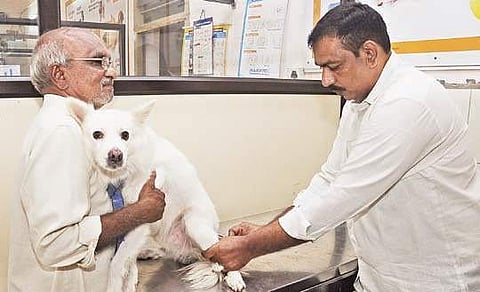

VIJAYAWADA: Increasing air pollution in the city is not just affecting humans, but also causing respiratory distress to animals. As per reports, 6,553 more canines and 309 bovines suffering from various physical ailments, including breathing distress, were treated in the first nine months of 2019 as compared to 2018 at NTR Veterinary Super Specialty Hospital in Vijayawada.
Speaking to TNIE, Master of Veterinary Science Dr V Madhu Babu, said, “Out of the various cases we come across every day most of them pertain to respiratory distress in pets. Though there is not a huge increase in such cases as compared to the previous year, if we consider the data of the last five years we can see that instances of air pollution-related ailments have increased drastically.
While 111 more canines, suffering from breathing problems were treated this year as opposed to 2018, the number of bovine treatment cases have remained constant; with 51 animals being treated both years,” adding, “Around 562 dogs underwent treatment for respiratory problems in 2019 compared to 451 the previous year.”
Dr Madhu Babu also said the air filtration mechanism in animals is not as fast as humans and thus small pollutants can easily enter their lungs thereby causing breathing ailments.
“The extreme changes in the city’s weather and excess use of air conditioners at home are also responsible behind destroying immunity in pets. “Unlike huskies, all dogs need not be kept in air-conditioned rooms for hours on end. However, as Vijayawada has a hot and humid climate, people usually live in air-conditioned homes. Thus, when they take their pets outside for a walk, where the temperature is high, the contrasting temperatures affect their pets’ respiratory glands and lungs,” said Babu requesting the residents not to buy dogs of breeds such as husky, as the Indian climate is not suitable for their health.
However, pet lovers have a different view. “Just because our climatic conditions are not good enough, we cannot compromise on our love towards a certain breed of dogs. We do learn about everything before buying them- ranging from the food they consume to what temperatures they should be kept in. But, yes, I do understand that we should also think about the animals. Instead of compromising on our love for animals, we should make efforts to make the climatic conditions suitable for them by working towards maintaining environmental balance,” said Manoj Singh, who brought his husky for treatment at the hospital.
However, some pet owners feel it is a criminal act to make animals suffer for self-pleasure. “Of course, one should consider only the favourable factors while buying a pet. In my experience, I would say that today’s climatic conditions are such that if one observes any small change in their pet’s behaviour, they should immediately get their pets checked as it doesn’t take time for a simple cough to turn into a chronic disease,” suggested Neeraj Jain, whose labrador is undergoing treatment at the hospital.
In view of the increasing pollution levels, some pet lovers feel that a complete ban on crackers and outdated vehicle models is the right way to curb air pollution. “On one hand where Diwali is one of the most loved festivals for Indians, it is equally dreadful for the pets. The poor animals not only get scared by the noise of firecrackers but also suffer from breathing problems due to the increase in smoke levels. Apart from that the exhaust fumes of vehicles also add to the high pollution levels,” said Riya Shetty, an MBBS aspirant.
Surprisingly, veterinarians believed that pet animals are more prone to such ailments as compared to stray animals despite having better living conditions. “The stray animals are born and brought up in rough conditions, which strengthens their immunity. On the contrary, pet animals are weaker as they are less exposed making them comparatively less resistant,” said Babu.